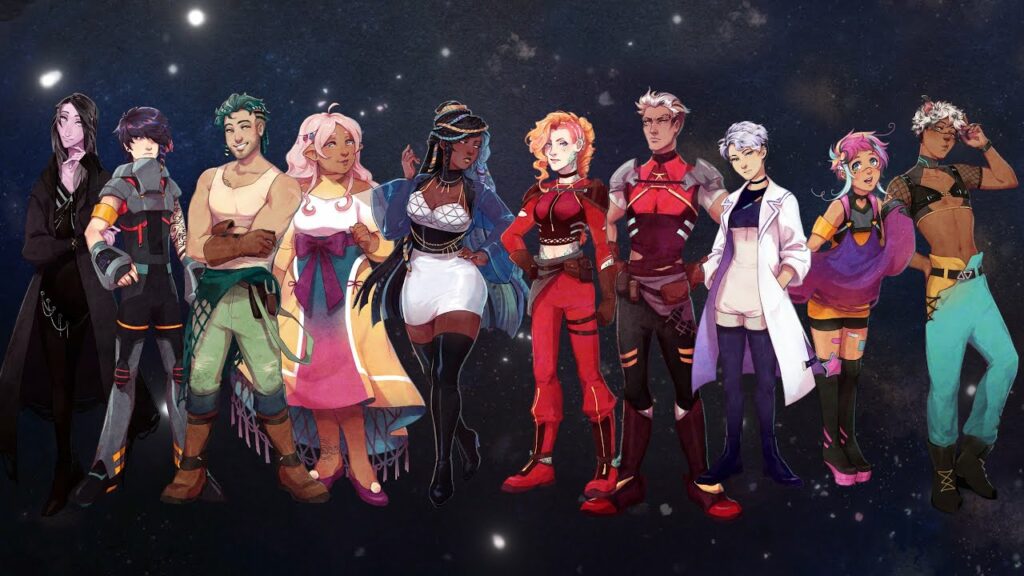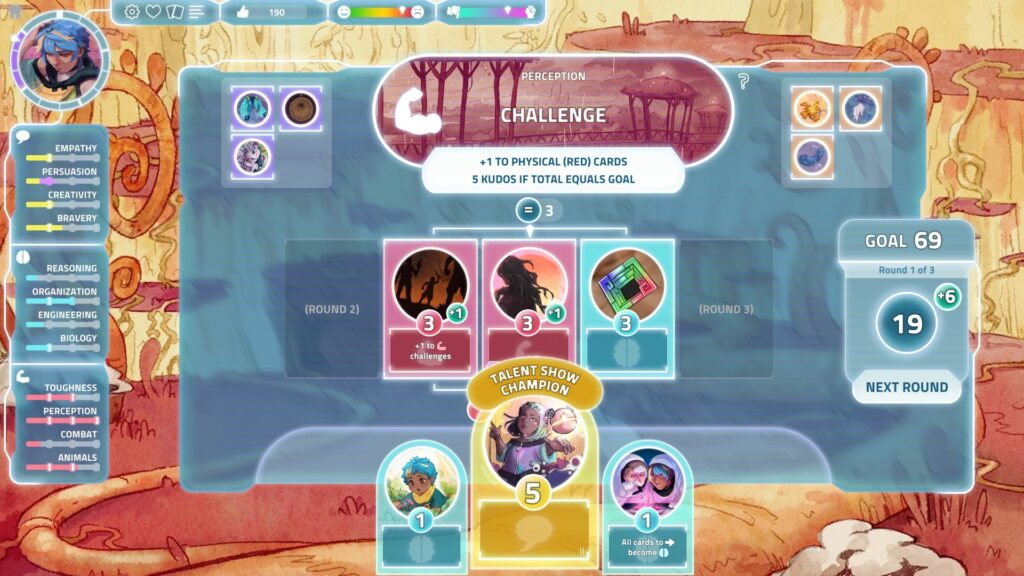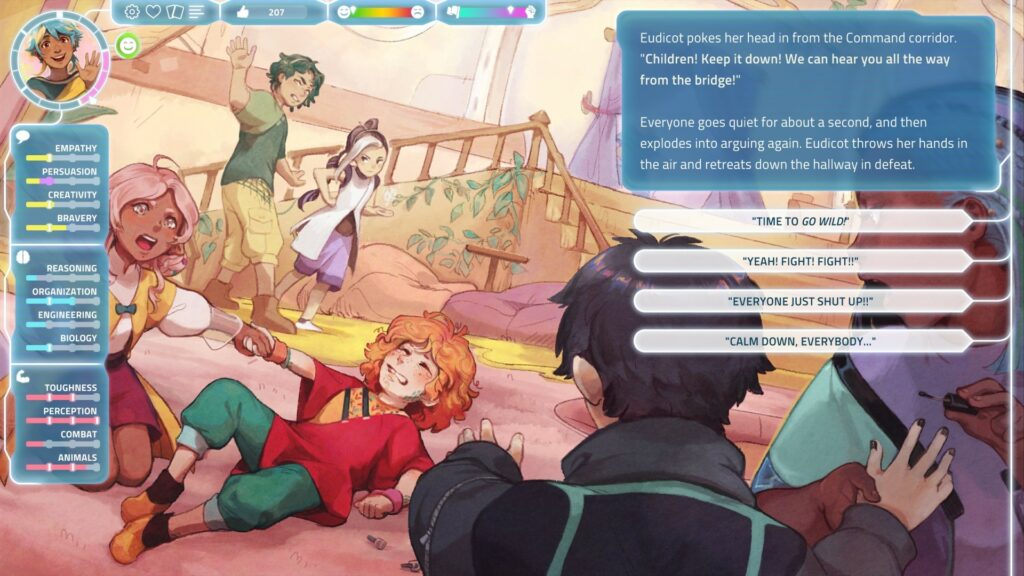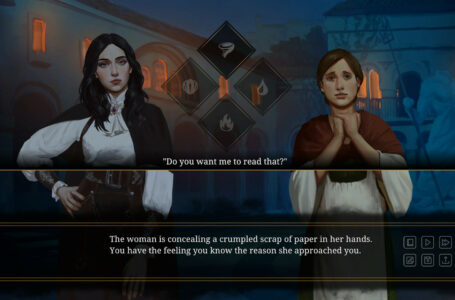Initial thoughts and mixed feelings on I Was a Teenage Exocolonist
As I write this, I’ve completed one playthrough of I Was a Teenage Exocolonist, a newly released narrative RPG and visual novel hybrid that makes use of a card deck as your main means of interacting with the game. As with any good visual novel game, multiple playthroughs are needed to understand the full scope, but I thought I’d provide some initial impressions after that first run.
I Was a Teenage Exocolonist has a total of 29 endings, and it’s quite a mission to know what the “best” one is, let alone work towards it. So while I make my way towards fully formulating a final opinion, I wanted to share some general thoughts on this game, which I was very excited for just weeks before its release.
After really enjoying last year’s Gnosia, I was hoping that I Was a Teenage Exocolonist would scratch that particular sci-fi itch — and for the most part, it has… just maybe not for too many subsequent playthroughs.
A beautiful downer

I Was a Teenage Exocolonist is a game where you experience a decade of growing accustomed to living on an alien planet — and it really throws you for a loop right away. The main menu screen immediately lists a litany of “trigger warning” events, and sets certain expectations for anyone jumping in: this game is going to have its downer moments, and boy, does it deliver.
While death ends are to be expected in a game whose setting doesn’t really expect you to live until your 20th birthday, it’s the tragedy found in story events that can be avoided in later playthroughs that really hits home. When death does affect the player character is when things get heavy — and mechanically speaking, you have to rest for a full in-game month due to stress and loss personally affecting you. Moreover, friends can become suicidal due to certain events, and funerals can and will be a regular scene during any given playthrough.
So it can indeed by quite stressful to know that your actions might jeopardise the wellbeing of your fellow colonists and friends, or when you have the knowledge that you cannot avoid early indicators of certain disasters from transpiring. It’s an immensely appealing juxtaposition with the cute, cosy and unassuming surface-level appearance; the combination of this aesthetic with impending doom being around every corner is thrilling, and never gets tiresome.
I really like my bleak stories, as my enthusiasm for Red Embrace: Hollywood will demonstrate, and I especially like it when tragedy and pessimism are reflected through character arcs and storylines. Unfortunately, with I Was a Teenage Exocolonist, the majority of this feeling is in the initial playthrough, as the main reason to revisit the game is to try and prevent all the misfortune from transpiring!
It feels like the initial shock value and harrowing nature of it all is quickly swept under the rug from here, meaning that “correcting” the events results in missing out on some interesting character development and narrative arcs. The entire point of the game is to see the colony thrive, save as many of your fellow colonists as possible and experience every version of the player character you can for completion’s sake — and to unravel all the narrative possibilities.
An undoubtedly meaningful experience as its crux
This isn’t really a bad thing in the grander scheme of things, of course. As soon as you initiate your second playthrough, the butterfly effect and time manipulation show up in full force thanks to the player character remembering their past life. And that ties in with the mechanics, too; the core gameplay mechanic of building a deck of cards is a reward for experiencing new events and achievements.
That’s because the cards represent memories. Each interaction, dialogue choice, activity selection and indeed any single way to experience just a day in the life of your Exocolonist will open new doors in how to experience the game, future events and other prospects. Some experiences and choices reward you with higher-scoring cards, while others you can choose to forget about completely — such as the zero-scoring cards that stem from your birth, taking your first steps, speaking your first words and learning to giggle.
To face the game’s monstrous events as well as save your friends and perhaps even the entire planet, equipping yourself with more powerful cards is the move to make in order to overcome past failures, and there’s a subtle nuance and beauty there. To become the sort of person we need to be to “win”, sacrifices do have to be made, even if it’s the most throwaway of memories. And with over 800 story events to experience, it’s an interesting approach to force players to shape and build their most ideal player character.
This is where I’ll backtrack a little about the game’s dwindling sense of tragedy and pessimism; the future may not be as bad as we think it might be — either in the game’s own planet of Vertumna, or on our very own Earth. The game touches on a number of real-world aspects in its lore and worldbuilding, such as colonisation, imperialism and environmental harm, as well as all the mental trauma the characters suffer and will be able to relate to. It’s all rather heavy stuff.
But through all the lives the game encourages you to live, there’s a light at the end of the tunnel. The driving force is that even the very worst of our memories help to make us who we are, for better and for worse. This gives the game a feeling of being a warm hug enveloping you — or a push on the back to keep going, and I love that, particularly coming from a game released in 2022.
A mechanically casual game of deckbuilding

I Was a Teenage Exocolonist takes the “choices have consequences” aspect of any visual novel and pushes it up a notch with the way that subsequent playthroughs are affected by your “memories” of previous runs, as represented by the cards.
With each new memory added to your deck, you’ll have even more choices to play from your hand in order to come out victorious in each moment of your life — be it a run-in with a new alien to add to the bestiary, a yearly festive challenge, or simply catching a sportsball to impress your friends.
The game is completely run on this system, and that comes with a few issues — mostly that it’s basic and a bit repetitive. You simply have to accumulate a certain number of points across three rounds, and pairing up similar colours racks up even more points. This issue is compounded by cards you can equip that have stat boosters, making the game even easier — even on its harder difficulty mode — though you can of course ignore this aspect if you prefer. You can also replace the card game sequences with a coin flip if you’re not interested in this part of the game.
It’s all far too casual and forgiving to even consider that, though, since if you’re well-rested enough, you can sacrifice your stress level to succeed at any of these card games. There’s a very generous amount of skills and colony jobs to customise, but these again only add small changes to its narrative. There’s not a ton of incentive to live different lives when the only differences are a few dialogue changes.
Slow burn romances with unsatisfying payoffs

Probably my biggest issue with the game comes in the aspect I tend to draw most enjoyment for in games like this: the romance. As I’ve said before, romance is often a major factor in intriguing me enough to purchase a game, and it was no different in the case of I Was a Teenage Exocolonist. Unfortunately, the game has some of the most lacklustre romancing in any game of this type. They’re all slow burners that play out as batting flirtatious comments back and forth until an eventual confession occurs.
While dating, you can take out your significant other on dates, but there’s a catch. There’s ten possible love interests, but six of them are already interested in another person. You can be a homewrecker or a willing bystander to disaster in an attempt to breeze your way into someone’s heart when their beloved meets a terrible fate early on.
A couple of characters are also interested in polyamorous relationships; if you’re not into that, this can remove you from the equation, and yet it’s never made particularly clear until the character in question breaks things off with your player character because they were never exclusive to begin with.
It’s kind of mean-spirited when your player character has to behave in some fairly unpleasant ways to bag someone at times — but in the case of the polyamorous relationships it is at least nice to see how everyone is catered to. It would have been nicer, though, for the romances to feel less “temporary”; even Fire Emblem: Three Houses’ “paired off” endings did a much better job.
Overall, the romance feels lacklustre, particularly when it’s such a marketing point. It feels underdeveloped, and the epilogue feels unsatisfying. We get very little information about the life you end up living with the person you partner up with.
I’m more inclined to praise the individuals on their own merits, however. Characters are, on the whole, deep and have interesting arcs, even in the case of non-romanceable supporting characters. And your actions can help them grow into better people, too; in the case of the love interests, they each have their own unique parameters that relate to their character arcs, and you can influence them both positively and negatively.
This side of things has an impressive amount of attention to detail, so while I dislike the romance aspects on the whole, the characters and their relevance to the story have been well conceptualised and implemented. They’re far more than just one-note; most of them are integral to the game in their own ways.
A tale that anyone can take something meaningful from
Returning fully to the more positive side of things, the game is highly customisable, embracing the player and their preferences to an admirable degree. You can select your pronouns and appearance based on a sliding scale, allowing for an accurate sense of projection for non-binary players as well as those with more defined masculine and feminine selections — and this can also be changed at any time.
Much like in Our Life: Beginnings and Always, certain choices also shape your character, such as food habits, romantic preferences and sexuality. As we’ve already seen, there are love interests of varying sexualities and romantic preferences, including bisexual, heterosexual and polyamorous romances. The game brilliantly illustrates its characters and world, accurately depicting a diverse colony and world full of different ethnicities, beings and beliefs. As a result, it’s one of the most genuinely progressive gaming experiences I’ve ever had.
Concluding thoughts
As a spacebound Groundhog Day-style coming-of-age tale completely tailored by players and providing plenty of reason to revisit it, I Was a Teenage Exocolonist is definitely worth its price tag. Artwork is gorgeous, and especially stunning during expeditions. The music is brilliant, too, with a pleasingly ethereal sound helping to establish the alien setting. And then the writing and themes all hit with so much meaning and complexity behind the seemingly endless dialogue and interactions.
I may have some complaints about the game’s overall design choices and gameplay mechanics, but I will certainly give it another playthrough or two and may well change my mind. If that ends up being the case, you’ll all be the first to know, as there’s a ton of potential here. And in the meantime, if you like what you’ve seen and heard so far, you’ll almost certainly find something of worth here — so I encourage you to check it out for yourself.
I was a Teenage Exocolonist is available on PC via Steam, PS4 and Switch.
Join The Discussion
Rice Digital Discord
Rice Digital Twitter
Rice Digital Facebook
Or write us a letter for the Rice Digital Friday Letters Page by clicking here!
Disclosure: Some links in this article may be affiliate links, which means we may earn a small commission if you make a purchase after clicking on them. This is at no additional cost to you and helps support Rice Digital!
- Sigh of the Abyss: Shadow Bonds – Prologue Review - October 7, 2023
- Is She The Wolf? is wickedly addicting TV - October 6, 2023
- The steady consumption of Slow Damage - October 5, 2023






